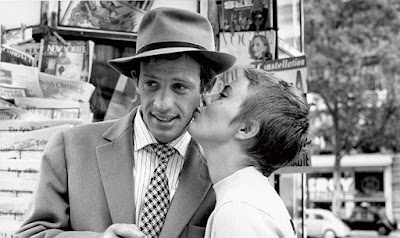By James V. Ruocco
French New Wave, a cinematic art film movement that emerged in the late 1950s was especially known for its obvious rejection of traditional filmmaking techniques, styles and conventions in favor of experimentation and iconoclastic beliefs, doctrines and practices.
One of the most influential movements in the history of cinema, French New Wave was categorized by its new approach to editing, visualization and narrative, offset by themes and engagement that reflected the social and political upheavals of the era.
Using portable equipment with very little set up or time constraints, the New Wave filmmaking process included long takes and tracking shots, fragmented, discontinuous, non-linear editing, direct sound employment, improvised dialogue and less complicated lighting.
Logic, at times, was secondary as was storytelling questions and resolutions in a particular film that were not always answered in the end.
Nonetheless, this quirky documentary like-style was lauded by critics and audiences alike for its realism, irony, subjectivity, commentary, abstraction, narrative ambiguity and its revolutionary expression and groundwork.
This eye on the word process - bold, direct, abnormal, influential - was also held in esteem worldwide, particularly at film festivals where these works were viewed untouchable by criticism.
Directorially, French New Wave was unstoppable.
Among its primary contributors and prominent pioneers were Jean-Luc Godard, Éric Rohmer, François Truffaut, Claude Chabrol, Jacques Demy, Alain Renais and Jacques Rivette.
Their films - there are many - exquisitely capture the essence of New Wave.
Among them:
Breathless (À bout de souffle)
(1960) director: Jean-Luc Godard
Shoot the Piano Player (Tirez sur le pianiste)
The 400 Blows (Les quatre cents coups)
(1959) director: François Truffaut
Cleo from 5 to 7
(1962) director: Agnès Varda
The Umbrellas of Cherbourg (Les Parapluies de Cherbourg)
(1964) director: Jacques Demy
Jules and Jim (Jules et Jim)
(1962) director: François Truffaut
Vivre Sa Vie
(1962) director: Jean-Luc Goddard
A Woman Is a Woman (Une femme est une femme)
(1961) director: Jean-Luc Godard
Paris Belongs to Us (Paris nous appartient)
(1961) director: Jacques Rivette
Les bonnes femmes
(1960) director: Claude Chabrol
The Soft Skin (La peau douce)
(1964) director: François Truffaut
La Chinoise
(1967) director: Jean-Luc Goddard
Last Year at Marienbad (L'Année dernière à Marienbad)
1962) director: Alain Resnais
Pierrot le Fou
(1965) director: Jean-Luc Godard
Le beau Serge





























































